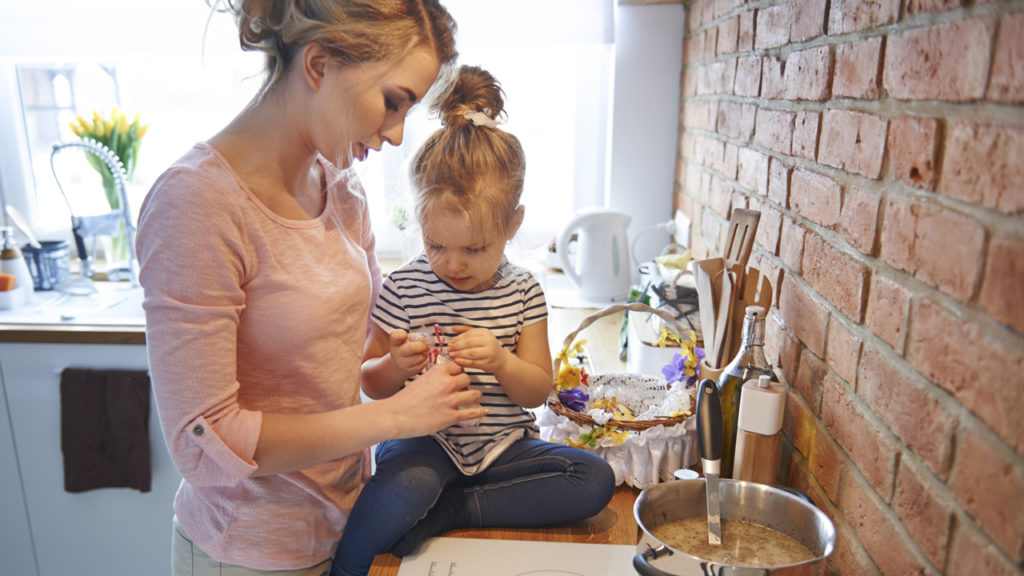I can’t tell you the exact moment I made the decision to be a stay-at-home mom.
I can remember a few of the moments that I acted on it — like when my husband and I started sacrificing for the “baby fund” or the day I handed in my resignation and said good-bye to almost 40 percent of our family income. But those were the action points, not the decision point.
I think that at different times in my life, I just started to know.
I’m sure it started in my own day care experience. After attending a group day care for much of my childhood, I took different jobs during my college breaks as a child care worker and nanny. Though most of my co-workers were nice, sweet ladies who tried to make the day pleasant for kids, I still began to see that there was something unique and special about a parent’s love that a child care worker could never duplicate. Even with my one-on-one time as a nanny, I saw that, as much as I cared about my job, it was still that — a job.
But what about me? I would wonder. I’m a well-adjusted, productive member of society, and I came through day care just fine. What’s the problem?
I thought about that — hard. Then the answer came to me in three little words: in spite of. Day care had not made my childhood happy. My childhood was happy in spite of my time in day care. It was my parents’ individual attention each night and on weekends that helped me to thrive. It wasn’t that the days were always bad, but that my parents’ love was always best.
I started to ask myself the hard questions: Who is going to raise my child someday? Will the nights and weekends be enough?
At times like that, I sometimes just longed for explicit biblical instruction. You know, some verse that would just settle the whole debate: “Thou shalt be a stay-at-home mom” or something like that.
I realized, though, that I was asking the wrong question. Instead of asking for a sign to point me down my specific road, I should look at God’s roadmap for motherhood. What did He expect of me? What did He want me to know?
I was already familiar with Titus 2 and Proverbs 31, but now I read them with a different eye. Instead of dismissing them as chauvinistic or as historically isolated (as I was prone to do as a girl-power collegiate), I looked to try to learn what God might be telling all women, including me as a future mother.
At that time, it wasn’t so easy to hear. But I found that I was to work hard for my household. I was to love my husband and children. I was to make sure that those under my roof were clothed, fed and instructed. I was to be busy with the work of the home.
Though Proverbs also describes a woman who bought fields, had profitable trade and made garments to sell, there was still the overarching idea that she did these things in the context of her household. Her work enriched her family and her home; it didn’t conflict with them.
In short, raising my children was one of my primary responsibilities. But, the question remained, would I take care of that responsibility myself, or would I delegate it?
In considering that question, I found guidance in much of Scripture, but I remember finding it one place I didn’t expect — in Matthew 15, the account of the Canaanite Woman whose daughter was possessed by demons. Desperately, the mother cries out for help from Jesus.
“It is not right to take the children’s bread and toss it to their dogs,” Jesus tells her.
“Yes, Lord,” she says, “but even the dogs eat the crumbs that fall from their masters’ table.”
Jesus commends her faith and heals her daughter.
Hardly a commentary on today’s motherhood issues, huh? After all, Jesus is making the point that the Gospel was to be given first to the Jews. But I was struck by two things. The first was the mother’s tenacity to do what her daughter needed, no matter the cost. The second was Jesus’ phrase: “It is not right to take the children’s bread and toss it to their dogs.”
Jesus is talking about priorities. In His analogy, the child is understood unquestionably to be more important than the dog. The child gets the best and the first. That led me to question my own priorities. Would my child get the best and the first or would my job?
As a Christian, I knew that not only would my children be little human beings, they would be eternal souls. Their bodies would have physical needs. Their minds would have emotional and intellectual needs. But their souls would need much more: an introduction to our Lord and instruction in His Word.
I finally decided that nights and weekends were simply not enough.
I had absolutely no desire to criticize women who chose differently. I just knew that when I faced my Maker and had to give account of how I had spent this season of my life that, no matter the sacrifice, there was only one thing to do.
Though relieved to have made the decision, I also felt that my choice had plunged me, quite unwillingly, straight into the “mommy wars.” I figured I would be judged and be assumed to be judging. I thought that moms were divided into two camps — those who agreed with me and those who absolutely did not.
The truth, I’ve since found out, is very different. A study by Pew Research found that only 10 percent of stay-at-home moms think that a full-time employed mom is the best situation for children — hardly a surprise. What was a surprise to me is what working mothers think — only 11 percent of them believe that a full-time working mom is the best situation for children. The two groups, portrayed to be at war with each other, really have very similar ideas as to what is best for children. It seems that God has given women — all women — something that draws them to their children.
Those numbers got me to wondering two things. First, why hadn’t I ever heard this before? For years, I had been encouraged by educators, the media and the “women’s movement” to choose a career and pursue it vigorously. Why hadn’t they told me that, when children arrive, almost 90 percent of working moms find that full-time careers are no longer the ideal situation?
And second, why the disconnect? If both groups of women generally agree about what is best, why aren’t we doing the same thing? The answer, for most of the moms I talk with, is money.
“I just never considered myself ‘stay-at-home’ material,” my friend Leslie told me the other day. “I liked my work too much. I liked adult conversation and interaction too much. I just never thought I would want to stop working.” But Leslie now wants to stay at home and is trying to make her family’s budget work and their savings stretch. She’s making it, but isn’t sure how much longer she can.
Leslie’s advice back to her 20-year-old self? “Save! Save all you can, so that you’ve got options.”
My advice would be very similar. I’d tell 20-year-old Heather that there’s a 90 percent chance that she won’t want to work full time and that the No. 1 stumbling block to staying home will be finances. I’d tell her to spend less, to avoid student loans and tight mortgages, and to live on one salary from day one of her marriage.
And then I’d tell her to go for it. I’d tell her not to be afraid. I’d tell her that staying at home will help her family to work — and to work very well.
Dr. James Dobson has a wonderful quote about motherhood: “No job can compete with the responsibility of shaping and molding a human being in the morning of his or her life.” I think that is a beautiful word picture of infancy and the toddler years — the morning of one’s life. I’ve stayed at home for seven years, and I’m so thankful that I’ve been the major part of my children’s mornings.
My husband and I could have planned better, but we’re thankful that we had a plan and chose to raise our children at home. Others we know didn’t plan, but are making huge sacrifices to do the same thing. Still others we know want to raise their children at home, but feel that their financial commitments have left them no choice.
Maybe you’re already in one of those groups. Or, maybe, you find yourself in the blessed situation of being able to make decisions now that will give you options when you become a mom.
I wish that someone had told me how much my babies would drastically affect my ambitions and desires. So that’s what I want to do: to tell you. Not to inspire guilt, but to inspire hope. Motherhood is a wild ride, but it is completely worth it.
“… but we were gentle among you, like a mother caring for her little children” (1 Thessalonians 2:7).
Copyright 2008 Heather Koerner. All rights reserved. International copyright secured.











